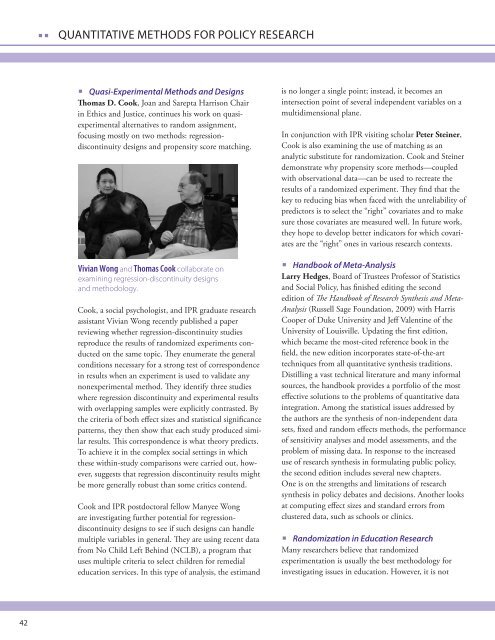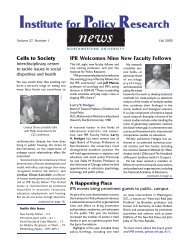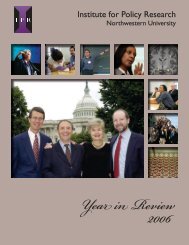IPR - Institute for Policy Research - Northwestern University
IPR - Institute for Policy Research - Northwestern University
IPR - Institute for Policy Research - Northwestern University
You also want an ePaper? Increase the reach of your titles
YUMPU automatically turns print PDFs into web optimized ePapers that Google loves.
Quantitative Methods <strong>for</strong> <strong>Policy</strong> research<br />
< Quasi-Experimental Methods and Designs<br />
Thomas D. Cook, Joan and Sarepta Harrison Chair<br />
in Ethics and Justice, continues his work on quasiexperimental<br />
alternatives to random assignment,<br />
focusing mostly on two methods: regressiondiscontinuity<br />
designs and propensity score matching.<br />
Vivian Wong and Thomas Cook collaborate on<br />
examining regression-discontinuity designs<br />
and methodology.<br />
Cook, a social psychologist, and <strong>IPR</strong> graduate research<br />
assistant Vivian Wong recently published a paper<br />
reviewing whether regression-discontinuity studies<br />
reproduce the results of randomized experiments conducted<br />
on the same topic. They enumerate the general<br />
conditions necessary <strong>for</strong> a strong test of correspondence<br />
in results when an experiment is used to validate any<br />
nonexperimental method. They identify three studies<br />
where regression discontinuity and experimental results<br />
with overlapping samples were explicitly contrasted. By<br />
the criteria of both effect sizes and statistical significance<br />
patterns, they then show that each study produced similar<br />
results. This correspondence is what theory predicts.<br />
To achieve it in the complex social settings in which<br />
these within-study comparisons were carried out, however,<br />
suggests that regression discontinuity results might<br />
be more generally robust than some critics contend.<br />
Cook and <strong>IPR</strong> postdoctoral fellow Manyee Wong<br />
are investigating further potential <strong>for</strong> regressiondiscontinuity<br />
designs to see if such designs can handle<br />
multiple variables in general. They are using recent data<br />
from No Child Left Behind (NCLB), a program that<br />
uses multiple criteria to select children <strong>for</strong> remedial<br />
education services. In this type of analysis, the estimand<br />
is no longer a single point; instead, it becomes an<br />
intersection point of several independent variables on a<br />
multidimensional plane.<br />
In conjunction with <strong>IPR</strong> visiting scholar Peter Steiner,<br />
Cook is also examining the use of matching as an<br />
analytic substitute <strong>for</strong> randomization. Cook and Steiner<br />
demonstrate why propensity score methods—coupled<br />
with observational data—can be used to recreate the<br />
results of a randomized experiment. They find that the<br />
key to reducing bias when faced with the unreliability of<br />
predictors is to select the “right” covariates and to make<br />
sure those covariates are measured well. In future work,<br />
they hope to develop better indicators <strong>for</strong> which covariates<br />
are the “right” ones in various research contexts.<br />
< Handbook of Meta-Analysis<br />
Larry Hedges, Board of Trustees Professor of Statistics<br />
and Social <strong>Policy</strong>, has finished editing the second<br />
edition of The Handbook of <strong>Research</strong> Synthesis and Meta-<br />
Analysis (Russell Sage Foundation, 2009) with Harris<br />
Cooper of Duke <strong>University</strong> and Jeff Valentine of the<br />
<strong>University</strong> of Louisville. Updating the first edition,<br />
which became the most-cited reference book in the<br />
field, the new edition incorporates state-of-the-art<br />
techniques from all quantitative synthesis traditions.<br />
Distilling a vast technical literature and many in<strong>for</strong>mal<br />
sources, the handbook provides a portfolio of the most<br />
effective solutions to the problems of quantitative data<br />
integration. Among the statistical issues addressed by<br />
the authors are the synthesis of non-independent data<br />
sets, fixed and random effects methods, the per<strong>for</strong>mance<br />
of sensitivity analyses and model assessments, and the<br />
problem of missing data. In response to the increased<br />
use of research synthesis in <strong>for</strong>mulating public policy,<br />
the second edition includes several new chapters.<br />
One is on the strengths and limitations of research<br />
synthesis in policy debates and decisions. Another looks<br />
at computing effect sizes and standard errors from<br />
clustered data, such as schools or clinics.<br />
< Randomization in Education <strong>Research</strong><br />
Many researchers believe that randomized<br />
experimentation is usually the best methodology <strong>for</strong><br />
investigating issues in education. However, it is not<br />
42
















